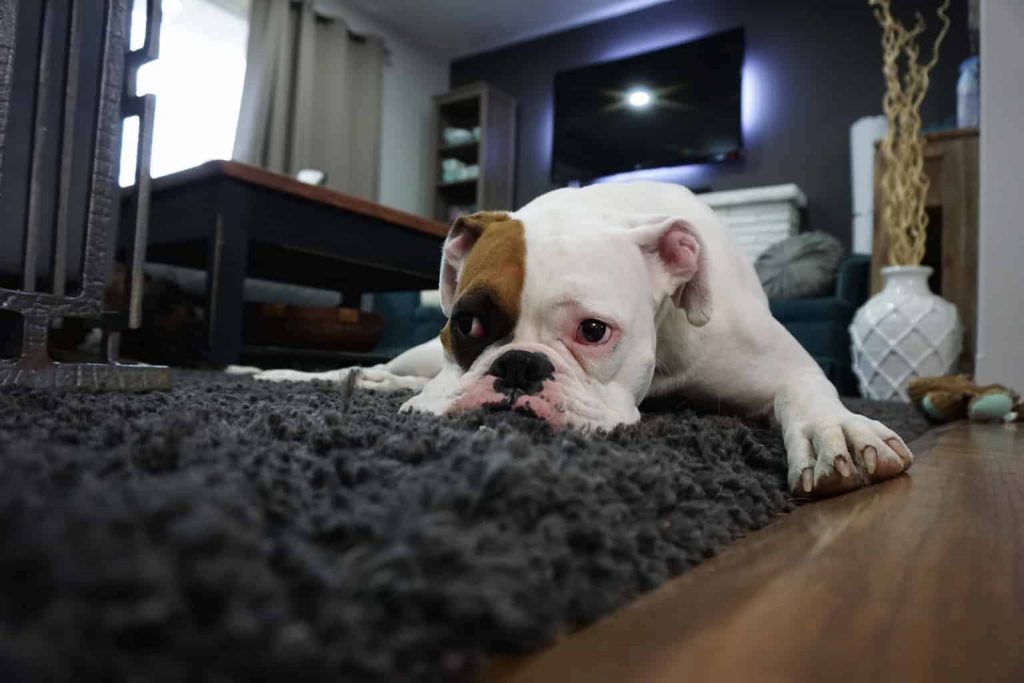SAD or seasonal affective disorder affects a great number of people during the winter. It also turns out that our pets,especially dogs, can be affected by winter sickness as well. So how do you detect winter depression in dogs and what solutions are available to remedy it?
It’s 8 am in the morning and the weather outside is still dark and gloomy. You don’t want to leave your bed because your room is so cold to walk around in. You also find yourself binging on every snack you find in your fridge and go right back to bed. This lethargic fete is what psychologists are calling winter depression or SAD.
Turns out that both human beings and animals have the same animal instincts. Animals like bears eat as much as they can (remember clearing your fridge) to fatten up before going into hibernation (read your warm bed). While this is a necessity for bears, for humans it is a sign of depression.
Here is another shocking fact. Your dog also gets seasonal affective disorder because of the gloomy weather. The first sign of winter depression in dogs is an unwillingness to do anything. Other symptoms follow which we are going to cover below. One way to also combat this is using a quality vitamin supplement for your dog.
Symptoms of Winter Depression in Dogs

Winter depression in dogs comes about because of how the season’s weather disrupts your dog’s normal routine. He can no longer go out and play in the sun because the sun has been replaced by thick layers of freezing snow. He was also used to the ambient light that seeped through the window caressing him to sleep. Now he cannot sleep normally and the long hours he spends ‘snoozing’ is actually a lethargic response to the changes around him.
His daily routines, like taking walks reduced too causing your pup to sink into further depression. If you notice any of these symptoms, know that your dog is already affected.
Sluggishness
Your dog will stop moving around much and his activity levels will reduce. Nothing excites him anymore even the sight of you holding the leash meaning it’s time for a walk. He may not be able to resist a tasty treat but he will move slowly towards you to have it. Sometimes he will just bonk your leg and whine as a sign he wants his snack.
Loss of Appetite
As the winter depression kicks in, your pooch will start eating less and less. Some dogs may just do the opposite and will overeat because they find food comforting. As long as your dog is not following his usual feeding routine, it is a sign of trouble.
Change in Sleep Patterns
Just like his appetite, your dog’s sleeping hours will also change. A lot of his time will be spent on sleeping. You might come home and find him resting his feeding bowl untouched.
Licking the Paws Too Much
Peculiar habits like excessive licking of paws may manifest. A depressed dog will continuously lick its paws as a way of soothing itself. In some dogs, licking can easily escalate to excessive biting which can cause self-harm.
Hiding A lot
Dogs suffering from depression may hide or isolate themselves from the rest of the family. Toy breeds show this behavior a lot because they tend to be needy when agitated or suffering anxiety. Your pup will isolate itself because it does not want to be bothered. Don’t take it personally, it’s just that he is feeling under the weather.
Aggressive Behavior
Some dogs will grow increasingly agitated when suffering the winter blues. Attempts to console him may be met by a snarl, snapping, or, worse, biting. Your dog may also get destructive around and gnaw at furniture or tear up his own sleeping mat.
Barking
This by far is the most annoying symptom of winter depression in dogs. Your pup may opt to bark incessantly because he feels restless and needy. Barking may be accompanied by whining as well and these two can keep you up all night.
The cure for Winter Depression in Dogs

So what do you do when your dog is suffering from winter depression? The following steps should help soothe your dog when he is not taking the winter weather very well.
Take Him to the Vets
First, you want to rule out the possibility of an underlying health issue. A local vet will examine your dog and test him for any sicknesses. If your dog is found to be healthy, then it just means the winter is being too hard on him. Nevertheless, this can be mitigated.
Maintain His Normal Routine: Exercise
Continue exercising your dog and taking him out for walks as usual. It is best to continue these activities even when winter kicks in so your dog does not notice the difference. However, if your dog is already trapped in the winter depression phase, start to slowly induce activity in his life.
Encourage him to take daily walks with you like he used to. Invest in pet toys that can help engage your dog in playtime even when indoors. If you had started him on training sessions, continue the routine even in winter. The trick is to keep his mind too busy to notice the weather difference. After all, an empty mind is the devil’s playground.
Ensure He Feeds Normally
This is the right time to spoil your pup with all the tasty foods he likes. However, you have to take care not to feed him a lot of junk that causes him to gain extra pounds. An obese pooch is ever sluggish because he finds it hard to move his weight. Give your dog the best foods that are full of nutrients to nourish his health.
Some dogs may refuse to eat completely. It’s all right, you do not have to shove dry kibble down his throat. Instead, you can ensure he gets his daily nutrients through the water he drinks. Powdered supplements like Bullyade are packed with minerals and multivitamins that are essential in nourishing your dog. In addition, Bullyade powder pet supplement comes in chicken and beef flavors; two flavors that your dog likes.
Sprinkle the healthy pet supplement in your dog’s water each time you refill his drinking bowl. Depressed dogs may not touch their food but they cannot resist the urge to quench their thirst. His normal food portions can be replaced with doggy treats. Dog treats help you feed your dog in bits rather than the huge serving he no longer is interested in chowing.
You can buy doggy treats in pet stores or making your own right at home. The advantage of baking your own doggy treats is you can determine the nutrients that go into the treats. Dogs love peanut butter, pumpkin, sweet potato, and many other human foods that are fit for pet consumption. You can incorporate all these ingredients in the doggy treats to make them tastier. To boost the nutrient value of the treat, add a few scoops of Bullyade powder in the ingredients as well.
Conclusion
Though winter depression in dogs affects dogs of all breeds, your pooch does not have to be a victim. Maintain his normal routine and ensure he is getting his daily nutrient intake. Also, keep him company as much as you can because neglect is one of the top reasons that cause dogs to go into winter depression.


